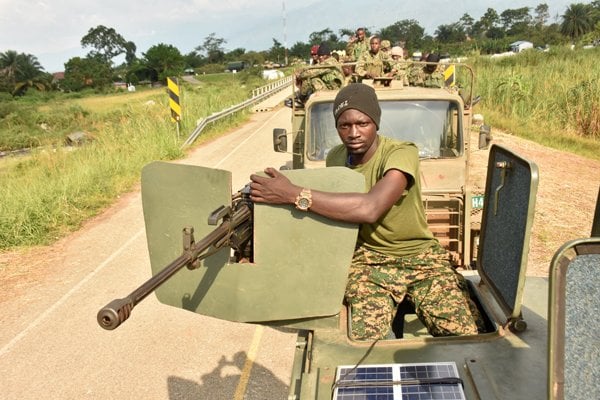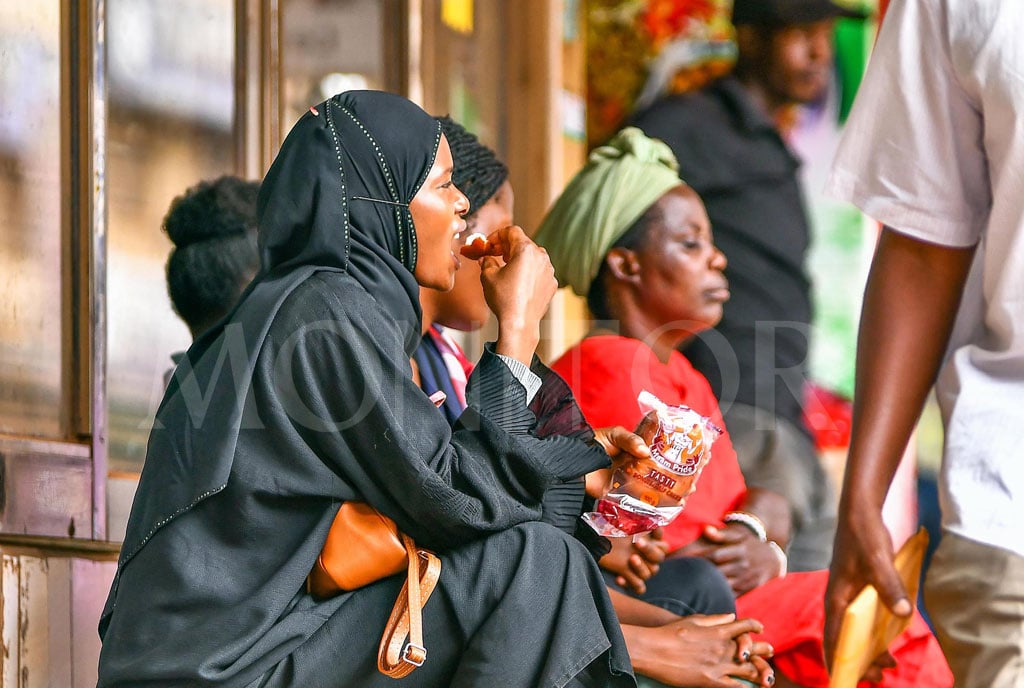Prime
ADF commanders apply for amnesty

The Chief Legal Advisor of Amnesty Commission, Mr Nathan Twino, and Acting Secretary Jebel Bwowe appear before the Defence Committee at Parliament yesterday. PHOTO / DAVID LUBOWA
What you need to know:
- The Amnesty Commission’s Chief Legal Advisor, Mr Nathan Twino, said he travelled to Goma, eastern DR Congo for a meeting, attended by four other countries he did not name, in May which, among others, discussed the ADF situation.
A number of Allied Democratic Forces (ADF) commanders and fighters, both on remand at Luzira Prisons and in the Democratic Republic of Congo (DRC) bushes, have applied for amnesty.
The Amnesty Commission’s Chief Legal Advisor, Mr Nathan Twino, said he travelled to Goma, eastern DR Congo for a meeting, attended by four other countries he did not name, in May which, among others, discussed the ADF situation.
He disclosed that some ADF commanders and members had approached the Commission’s liaison office, expressing interest to abandon subversive activities if the government could forgive them.
“Recently, they [ADF rebels] invited me because of what is happening…one of them who is charged [together] with Jamil Mukulu, invited me and said he [was] interested in amnesty,” Mr Twino said.
He added: “I have received his [application] form [and] I will go there and talk to him and process him.”
The ADF is a Ugandan rebel group whose members fled to, and continue to hibernate in, eastern DRC after being defeated at home. It operated mainly in western Uganda and one of its signature brutal strikes was an attack on Kichamba Technical College where they burned alive about 100 students and abducted dozens.
Tanzanian authorities arrested Mukulu, the group’s founding commander, in 2015 and turned him over to Uganda where he is detained at Luzira Maximum Security Prisons after being indicted on multiple capital offences, including terrorism and murders.
Appearing before Parliament’s Committee on Defence and Internal Affairs chaired by Sheema District Woman MP Rosemary Nyakikongoro yesterday, Mr Twino, without providing details of applicants, said they had received a string of requests for amnesty through their DRC contacts.
“But before we process [and grant amnesty], we pass this application to the DPP (Directorate of Public Prosecution) who then sees whether this person deserves amnesty,” Mr Twino said.
He added: “I can confirm that I was in Congo in May. I was in Goma [where] I attended a meeting with [leaders of regional states]. There were about five states represented and I represented Uganda and we were talking about this issue of ADF. We know what is happening.”
The travel to Goma by Mr Twino and others for a meeting to discuss the fate of ADF members coincided with increased diplomatic offensive by Kampala to charm Kinshasa to authorise UPDF re-entry into its territory to flush out the rebel group that has since morphed into an affiliate of the global Islamic State terror network.
Details of the May five-state meeting remain unknown, but after months of lobbying both the international community and Congolese government, Uganda began pounding ADF bases in Ituri and Beni territories on November 30. Both governments have announced that the offensive code-named Operation Shujaa (Hero), and commanded by UPDF Mountain Division commander, Maj Gen Muhanga Kayanja, is being jointly executed by troops of the two neighbouring countries.
Appearing on a talk show on this newspaper’s sister radio station, KFM, last weekend, State International Affairs Minister Henry Oreym Okello, in confirmation of our previous reporting, said Uganda had been preparing for long to attack the ADF and the opportunity to act presented itself following the November 16 twin bomb blasts in Kampala that government blamed on the group.
Exactly two weeks later, Shukoi Su-30 jets and artillery barraged four suspected ADF bases with firepower that Maj Gen Kayanja said punished the group members “seriously”.
The government has said little about actual fatalities and injuries inflicted on the ADF, including its targeted headquarters and camps of recruited foreign fighters.
A highly-placed security source told this newspaper that the group’s successor commander, Musa Baluku, did not die in the blistering first early morning raid. It was unclear if he escaped right before or during the raid or whether he left the base long before the strike was launched.
During yesterday’s parliamentary committee session, Mr Godfrey Wakooli, the legislator representing Kiboga’s Butiru constituency in Manafwa District, asked the Amnesty Commission to “seriously” consider the plea by some ADF commanders and fighters for pardon.
He called for tighter evaluation of, and better resettlement package for the applicants.
Under the current arrangement, an ex-combatant granted bail is entitled to transitional safety allowances, food, clothes, shelter, medical services, and short-term education.
Also included are beddings and other household items as well as a pair of hand hoes, 5 kilogrammes of maize and beans plus Shs263,000.
Revelations about the specifics of the package for returnees prompted Mukono North legislator, Mr Abdallah Kiwanuka, to demand that the government increase the amount given to the former rebel fighters to enable their seamless reintegration and transition to civilian life.
“The resettlement package is too little. I don’t think it is enough to convince someone to move out of the bush. It, therefore, needs to be revisited and increased,” Mr Kiwanuka said.
How to get amnesty
According to the acting Secretary of Amnesty Commission, Mr Jabel Bwowe, for one to be granted amnesty, he or she has to formally apply seeking approval from government.
Once the application is received, a comprehensive assessment is done on the applicant by the government to establish whether the applicant is ready to be reintegrated into communities.
The process also involves consultations with the Office of the Directorate of Public Prosecutions (DPP) which also files written recommendation on a given application or string of applications.
Once a party is granted amnesty, Mr Bwowe said, he or she undergoes a traditional cleansing ritual ceremony. The ritual is reportedly conducted by traditional leaders from the respective tribe or clan where the applicant hails.
Pardoned ex-combatants are given reinsertion package that includes homes supplies and garden tools and materials. This is later followed up with their reintegration, a long-term process which is meant to entirely settle the former rebels into their communities so that they don’t harbour plans of reverting to subversive activities.
Among the programmes that a returnee undergoes is training and skilling on practical skills such as tailoring so that they can directly generate their income.




